On July 24, 2025, a symposium titled “Implementing the Criminal Defense System and Strengthening Judicial Protection of Human Rights” was held at the Zhangjiang Office of the Pudong New Area People's Court in Shanghai. The symposium focused on the theme of “Promoting Full Coverage of Legal Defense in Criminal Cases,” co-hosted by the Chinese Society of Criminal Law and the Shanghai Higher People's Court, organized by the Pudong New Area People's Court and the Shanghai Lawyers Association, and co-organized by the Pudong New Area Justice Bureau. The event aimed to further implement the decisions and plans of the Central Committee of the Communist Party of China, gather wisdom, summarize experiences, and build consensus to provide theoretical support and practical guidance for deepening the work of full coverage of legal defense in criminal cases.
Mr. Tian Wenchang, advisor to the Criminal Law Committee of the All-China Lawyers Association and honorary director of Beijing King&Capital Law Firm, and Ms. Liang Yali, senior partner of Beijing King&Capital Law Firm, executive director of the Chinese Society of Criminal Law, and vice president of the Advanced Research Institute of Criminal Defense at Northwest University of Political Science and Law, were invited to attend the seminar. Mr. Tian Wenchang made a summary comment at the closing ceremony, and Ms. Liang Yali made a speech on the topic of “Lawyer Defense in Cases of Controversy over Guilt or Innocence” during the seminar.
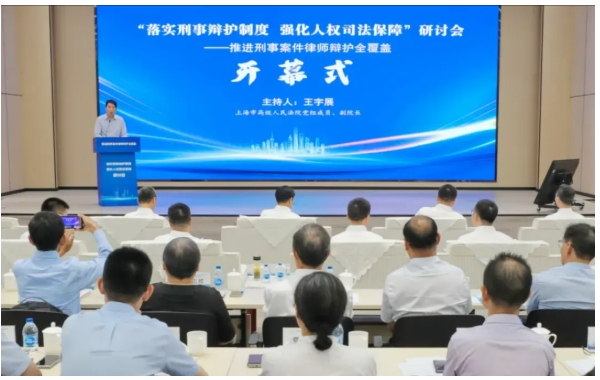
Opening Ceremony Venue
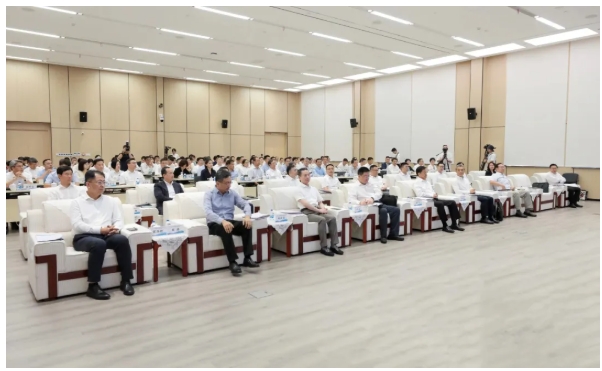
Seminar Venue
Jia Yu, Party Secretary and President of the Shanghai Higher People's Court and President of the Chinese Society of Criminal Law, Zhou Jiahai, Director of the Research Office of the Supreme People's Court and Secretary-General of the Chinese Society of Criminal Law, Zhang Lei, Standing Deputy Secretary of the Shanghai Municipal Committee of Political and Legal Affairs, Liu Jing, Member of the Party Leadership Group and Deputy Prosecutor-General of the Shanghai Municipal People's Procuratorate, and Song Lie, Member of the Party Leadership Group and Deputy Director of the Shanghai Municipal Bureau of Justice, attended the opening ceremony and delivered speeches. Zhang Jinsong, Member of the Standing Committee of the Pudong New Area Party Committee and Secretary of the Political and Legal Affairs Commission, delivered a speech. Huang Xiangqing, Deputy Director of the Social and Legal Affairs Committee of the Shanghai Municipal Committee of the Chinese People's Political Consultative Conference and Member of the Academic Committee of the Chinese Society of Criminal Law, and Tian Wenchang, Advisor to the Criminal Law Professional Committee of the All-China Lawyers Association, provided comments and summaries. Wang Yuzhan, Member of the Party Leadership Group and Vice President of the Shanghai Higher People's Court, presided over the opening and closing ceremonies.
Following the opening ceremony, over 40 representatives, including practical experts from the Supreme People's Court, the Shanghai Municipal Committee for Political and Legal Affairs, courts, procuratorates, and judicial bureaus in Shanghai, Jiangsu, and Zhejiang provinces, as well as scholars from renowned domestic universities such as China University of Political Science and Law, Central South University of Finance and Economics, Northwest University of Political Science and Law, Shanghai Academy of Social Sciences, Tongji University, Sichuan University, and Shanghai Maritime University, and senior criminal defense lawyers from Beijing, Shanghai, and Hubei, gathered to discuss four core topics: “The Mechanism for Ensuring Full Legal Representation in Criminal Cases” “Lawyer Defense in Cases Involving Disputes Over Guilt or Innocence,” “Lawyer Defense Under the Plea Bargaining System,” and “The Role and Position of Lawyers in Cases Involving Sentence Reduction or Parole.” Discussions focused on how to establish supporting mechanisms to ensure the “lawyer-assisted defense model” and “comprehensive defense quality,” how to safeguard the defense rights of defendants and the professional rights of defense lawyers in cases involving disputes over guilt or innocence, how to fully leverage the trial defense functions of lawyers under the leniency system for guilty pleas, and how to effectively ensure that inmates in commutation and parole cases have the right to legal representation. They analyzed the current challenges and bottlenecks and put forward a series of constructive opinions and suggestions.
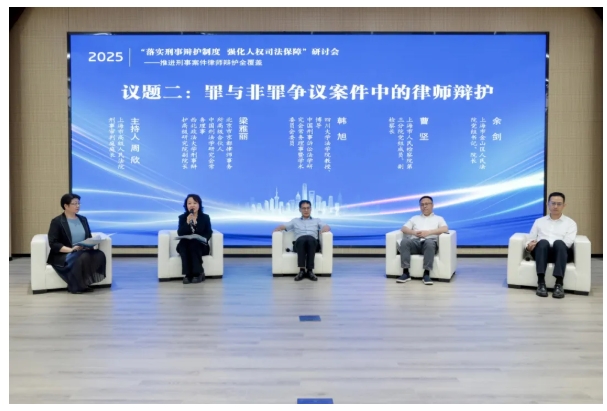
Attorney Liang Yali delivers a discussion speech
In the session on “Lawyer Defense in Cases of Criminal vs. Non-Criminal Disputes,” hosted by Zhou Xin, Chief Judge of the Criminal Trial Division of the Shanghai Higher People's Court, Ms. Liang Yali, senior partner at Beijing King&Capital Law Firm, executive director of the Chinese Criminal Law Research Association, and vice president of the Northwest University of Political Science and Law's Advanced Institute of Criminal Defense, participated as a guest speaker. She gave an in-depth discussion on the difficulties, key points, and strategies of lawyer defense in cases of dispute over guilt or innocence, focusing on the theme of “independent lawyer defense and the protection of the rights and interests of clients.”
Liang Yali emphasized that in cases involving disputes over guilt or innocence, the choice of defense strategies not only directly impacts the client's interests but also reflects the value aspirations of the criminal defense system. She addressed controversial issues in judicial practice, such as whether it is beyond the scope of a lawyer's role to defend a defendant who has pleaded guilty and accepted punishment with a not-guilty defense, or whether it meets the standards for a lawyer to defend a defendant who insists on innocence with a lesser-guilt defense. She provided detailed explanations from the perspectives of the source of defense rights, the boundaries of independent defense, and the role of lawyers in plea bargaining.
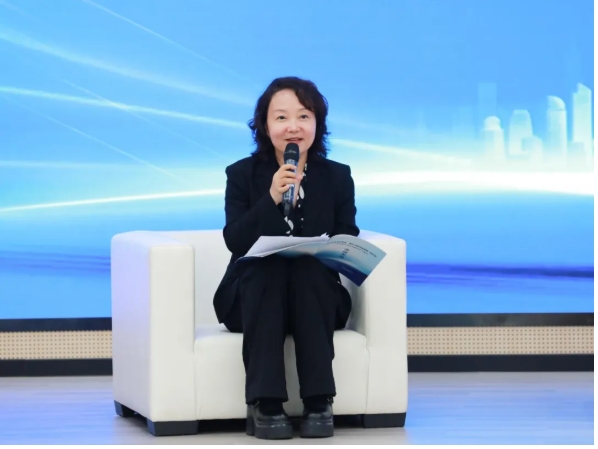
Attorney Liang Yali delivers a speech
In judicial practice, in some cases where the defendant pleads guilty and accepts punishment, if the defense attorney argues for innocence during the trial, the judge may interpret this as the defendant not pleading guilty. The prosecutor may even recommend that the collegial panel no longer apply the guilty plea and sentencing procedure to the defendant, thereby preventing lenient sentencing. In response, Liang Yali emphasized that the right to defense is a constitutional right of the accused, and independent defense by lawyers must be based on respecting the will of the client. While maintaining professional judgment autonomy, it must not harm the client's core interests.
Liang Yali pointed out that according to Articles 31 and 39 of the “Guiding Opinions on the Application of the Plea Bargaining System” issued by the “Two Highs and Three Departments,” the lawyer's signature on the plea agreement merely serves as a witness to the plea bargaining process and does not constitute an acknowledgment of the facts of the case or the sentencing recommendations. Furthermore, the subject of the plea bargain is the criminal suspect, not the defense lawyer, and the final decision to sign the plea bargain agreement rests with the criminal suspect, not the lawyer. Therefore, the lawyer's signature cannot be equated with an endorsement; the subject of the endorsement remains the criminal suspect.
Liang Yali believes that criminal defense, as an important component of the judicial system, directly impacts the realization of judicial fairness through its professionalism and standardization. In cases involving disputes over guilt or innocence, defense attorneys should conduct their work based on the following three dimensions: first, strictly adhere to the basic principle of “client-centeredness” to ensure that the exercise of defense rights always serves the legitimate interests of the client; second, accurately grasp the boundaries of independent defense, exercising professional judgment autonomously while avoiding harm to the client's core interests; Finally, clearly define their role in the plea bargaining process, fulfilling their duty as witnesses while坚持 substantive defense.
Liang Yali also emphasized that when addressing conflicts in defense positions, lawyers must uphold the independence of professional judgment while remembering the fundamental purpose of the right to defense—to protect the legitimate rights and interests of the client. This balance between professional judgment and the client's will precisely reflects the unique value of criminal defense work.
Liang Yali believes that China's criminal defense system is currently at a critical stage of development and improvement. As members of the legal profession, we should promote the formation of more scientific and reasonable defense standards through standardized defense practices. This will not only help achieve justice in individual cases but also provide a solid practical foundation for the construction of the rule of law.
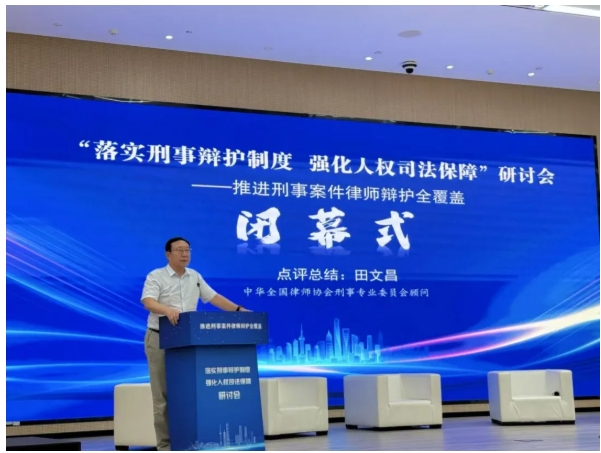
Lawyer Tian Wenchang delivers a summary speech at the closing ceremony
At the closing ceremony of the seminar, lawyer Tian Wenchang, advisor to the Criminal Law Committee of the All-China Lawyers Association and honorary director of King&Capital Law Firm in Beijing, and Huang Xiangqing, deputy director of the Social and Legal Committee of the Shanghai Municipal Committee of the Chinese People's Political Consultative Conference and member of the Academic Committee of the Chinese Criminal Law Research Association, delivered summary speeches.
The following is a summary of lawyer Tian Wenchang's speech:
I. Core Issues Regarding Full Coverage of Criminal Defense
1. Scope and Process of Full Coverage
Full coverage of criminal defense should be “full-process coverage,” encompassing not only the trial stage but also the investigation and prosecution review stages. Lawyer involvement is particularly necessary during the investigation stage, as early intervention plays a greater role in safeguarding the legitimate rights and interests of suspects and defendants. This is also a common practice abroad (e.g., lawyers immediately participate upon case initiation). Currently, coverage limited to the trial stage is incomplete and fails to fully leverage the role of defense. Of course, this requires a gradual improvement process, with achieving full coverage in the trial stage as the first step.
2. The Quality and Effectiveness of Full Coverage
Currently, criminal defense faces issues of “low quality and insufficient effectiveness.” While there is “form and personnel,” it has not achieved “effectiveness,” meaning that a significant portion of cases still have lawyers involved but with low service quality. Before achieving effectiveness, it cannot be called “effective coverage.” Therefore, the issue of full coverage in criminal defense must be deepened from two aspects: process completeness (covering all stages) and substantive effectiveness (achieving defense outcomes).
3. Specific Measures to Implement Effective Coverage
It is recommended to address the issue of effectiveness through the “government procurement of legal services” model, which can be implemented in two ways: first, establish specialized legal aid law firms funded by the government, with lawyers providing their services. These firms would exclusively handle legal aid cases, distinct from the current subsidy-based aid model; second, as a transitional measure, allocate subsidies to existing law firms, clearly designating the funds for the number of legal aid cases they undertake.
The “government procurement of legal services” model not only safeguards the rights of parties but also provides a growth platform for young lawyers, while balancing the relationship between lawyers and prosecuting authorities. It is akin to lawyers receiving government salaries to perform legal aid functions, while prosecutors perform prosecutorial functions—the difference lies only in their roles. Of course, these lawyers do not hold public office status.
II. Lawyer Defense in Cases Involving Disputes Over Guilt or Innocence
1. Key Issues and Practical Challenges.
First, the exclusion of illegal evidence often remains a formality: the exclusion of illegal evidence is a critical component of not-guilty defenses, but in practice, most exclusion procedures fail to play a substantive role, making it difficult to truly exclude illegal evidence. Courts must strengthen their emphasis on exclusion procedures; otherwise, not-guilty defenses will struggle to achieve their intended effect.
Second, issues of legislative wording and judicial interpretation: In innocence defense cases, disputes over substantive issues are a prominent feature of criminal defense in China. It is common for there to be no dispute over the facts, yet opposing views on guilt or innocence. The reasons for this include: First, the abstract nature of legislation leads to disputes (for example, the crime of issuing fraudulent VAT invoices lacked the wording “intent to defraud taxes and the resulting consequences,” leading to numerous wrongful convictions, which were not corrected until the 2024 judicial interpretation); Second, some judicial personnel have misunderstandings of the law (e.g., expert witnesses are restricted from participating in cross-examination or speaking in court, and there are significant discrepancies in the understanding of the elements of a crime).
2. The issue of the independence of the right to defense.
The China Bar Association's “Standards for Lawyers Handling Criminal Cases” clearly states that “lawyers shall not, against the will of their clients, present defense opinions that are unfavorable to their clients,” but in practice, there are still discrepancies in understanding and implementation. It is necessary to reach a consensus on the concept and correctly understand the essence of the independence of the right to defense.
III. Practical Issues Under the Plea Bargaining System
1. The Root Causes of Unequal Prosecution and Defense.
The core reason for the prosecution's “dominant” role in plea bargaining lies in the court's failure to fully exercise its judicial authority. If the court maintains its neutrality and the authority of its judicial power, it can alleviate issues of unequal prosecution and defense.
2. The Reasonableness of the Prosecution Conviction Rate.
Internationally, the prosecution conviction rate is approximately 90% to 95%, while in China it reaches 99%. Excessively pursuing a high prosecution conviction rate violates the principles of litigation, leading to self-imposed pressure on the procuratorate and affecting the fair handling of cases. It is essential to correctly recognize the differences in evidentiary standards across different stages of litigation and return to the essence of litigation.
IV. Lawyer Participation in Sentence Reduction and Parole
Lawyers should continue to provide professional legal services during the sentence reduction and parole stage to safeguard the rights of detained individuals, which can be viewed as an extension of the right to defense (defending to secure the right to sentence reduction and parole). Currently, lawyer participation in this stage is virtually nonexistent, and this issue should be given serious attention and addressed through implementation.
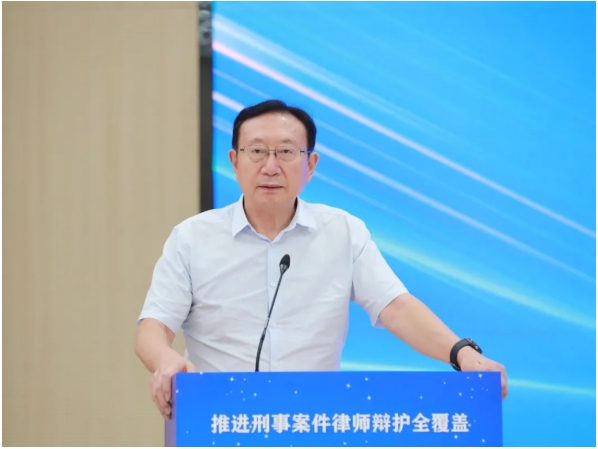
Finally, Tian Wenchang emphasized in his summary that achieving full coverage of criminal defense requires focusing on the comprehensiveness and effectiveness of the process, improving quality through institutional design (such as government procurement of services); addressing issues related to exclusionary procedures, unclear legislative language, and judicial misunderstandings in the defense of guilt or innocence; strengthening the impartiality of the court in the plea bargain system; ensuring lawyer participation in the commutation and parole stage; and ultimately achieving comprehensive protection of the rights of the parties involved.
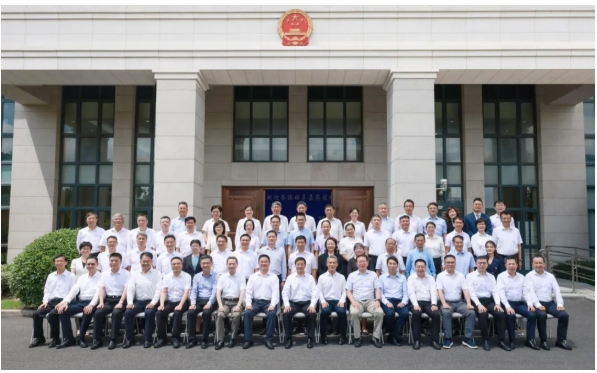
Group photo of participants
Promoting full coverage of lawyer defense in criminal cases is a foundational project for building a higher-level rule-of-law China and a safe China, and it holds significant importance for enhancing the level of judicial civilization and solidifying the legal foundation of the modernization of the national governance system and governance capabilities. Shanghai, as a frontier of reform and opening-up and a high ground for rule of law construction, has basically achieved full coverage of lawyer defense in the trial stage since the pilot program was launched in 2017, and has accumulated valuable experience in exploring effective defense, digital empowerment, and institutional innovation. This symposium represents an important exchange of ideas and practices in the process of further deepening the reform of full coverage of lawyer defense in criminal cases.





